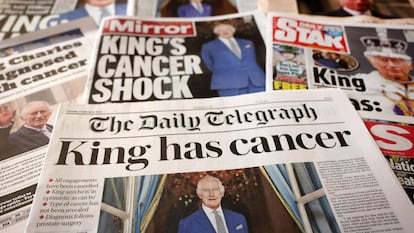From taboo to transparency: The beginning of the end of the myth of the strong leader
The stigma that still tinges the illness of rulers is breaking down, due to social changes and the evolution of the leadership model


His name was Max Jacobson, but his patients called him “Doctor Feelgood” because of the cocktail of hormones, painkillers and amphetamines that he injected into American patients in the mid-20th century. One of those patients was President John Fitzgerald Kennedy, whose good looks hid a chronically ill patient, hampered by unbearable back pain, which forced him to lean on crutches that he hid in his car.
During the presidential campaign of 1960 — when Richard Nixon and JFK faced off — the office of the endocrinologist who treated Kennedy’s Addison’s disease was ransacked. The alleged thieves had tried — in vain — to steal his medical records. It was revealed later on that Nixon was involved in this, as he was aware that he could exploit the poor health of his rival for electoral purposes.
In the end, Kennedy triumphed. The day after he was sworn in on January 20, 1961, the new president denied suffering from Addison’s. The New York Times described his condition as “excellent.” But by then, in reality, he was relying on Jacobson’s injections to cope with the pain.
Just like the charismatic president — who was assassinated in 1963 — many of his predecessors had previously lied about their health. “Hiding [your] real medical condition from voters is an old tradition of the American presidency,” The Atlantic magazine claimed in 2002, ignoring the fact that various leaders from around the world have hidden their ailments. That opacity has been total or partial. Last week, for instance, it was revealed that King Charles III suffers from cancer. It hasn’t been revealed what type of cancer he has, or what his prognosis is.
Cases such as that of Mohamed VI of Morocco — whose ailments are almost always a mystery — or the secrecy in the Vatican regarding the Pope’s health (which has long given rise to jokes, such as the one that claims that each Pontiff “is always healthy until he dies”) demonstrate the persistence of the taboo that has traditionally surrounded the illnesses experienced by leaders. That trend, however, is beginning to give way in the face of a growing demand for transparency about the health of those who wield political power. This demand is driven by “changes in society, information and the mass media,” explains Verónica Fumanal, a political communications consultant.
“Illness — on a social scale — carries with it an idea of weakness. Although the phenomenon of leadership has evolved and can no longer be explained by a leader’s personal attributes alone, it continues to be mythologized. Among collective beliefs, we continue to identify [robust health] as an attribute of leaders from past times, who always came from military establishments, monarchies, or religious power. For this reason, leadership continues to be linked to characteristics such as strength and aggressiveness,” the expert emphasizes.
The traditional conception of masculinity and power crystallized in the so-called “great man theory” of the military schools of the 1920s, according to Fumanal. Autocratic leaders such as President Vladimir Putin continue — even today — to present themselves as the embodiment of that myth. The longstanding rumors about the Russian leader suffering from cancer break with the staged photographs of Putin with a muscular bare torso, fishing or hunting.
Kennedy was the first president of the television era. In 1981, when French President François Mitterrand hid the metastatic cancer he suffered from (he lied for 14 years) this means of communication had already become widespread. Political consultant Luis Arroyo emphasizes that, in 2023 — “with people equipped with cell phones in every corner and with [24-hour] news cycles” — it’s “very difficult, if not impossible” for the health of a ruler to remain a state secret.
Elisa García-Mingo, an anthropologist and professor in the Faculty of Political Sciences and Sociology at the Complutense University of Madrid, agrees that the leadership model linked to the myth of the strongman is beginning to change. She cites the resignation of New Zealand Prime Minister Jacinda Ardern in January 2023, when the progressive politician claimed that she didn’t have the “energy” to remain in office. This specialist believes that such a shift is attributable to the growing number of female leaders. Additionally, from a communications standpoint, recognizing an ailment or an injury publicly can “sometimes serve to humanize a leader,” Verónica Fumanal points out.
The communications consultant highlights the growing demand for transparency regarding the health status of political leaders. This is especially the case when it comes to “elected politicians, who are periodically held accountable for their performance.” An example is the controversy that has surrounded U.S. Secretary of Defense Lloyd Austin, who, this past January, hid the fact that he suffers from prostate cancer and had been hospitalized for three days. Even President Joe Biden wasn’t aware of this.
The White House has tried to silence criticism by referring to the “personal nature” of the illness. But in the debate over whether the illnesses of a leader should be kept private or be made public, the second position has a compelling argument. Austin is second in the chain of command of the U.S. Armed Forces. His position obliges him to always be available in case of a threat to national security. Failing that, he must delegate his functions, as required by law.
“Democracies provide mechanisms that — to a greater or lesser extent — require transparency, especially from those who have executive duties. Charles III [can do] what probably wouldn’t be permitted to Prime Minister [Rishi] Sunak,” Arroyo points out. When it comes to someone with real power — not merely symbolic duties — citizens “require guarantees that there won’t be a power vacuum in the government or the administration,” the consultant emphasizes.
García-Mingo asserts that the controversy over 70-year-old Austin has highlighted another aspect of the secrecy around the illnesses of leaders: “ageism.” The image of “vulnerability” associated with poor health is exacerbated by widespread perceptions of elderly people. Ailments that usually occur in old age — prostate cancer, Parkinson’s, or cognitive decline — suffer even greater stigma and secrecy.
In 2019, the tremors experienced by German Chancellor Angela Merkel at public events unleashed speculation about a possible Parkinson’s diagnosis and an imminent resignation, just when she was about to turn 65. The recently-released report by Special Counsel Robert Hur — which describes Biden as able to make the defense of being an “old man with a bad memory” regarding his handling of classified papers — on top of the 81-year-old president’s public memory lapses, are all bolstering his Republican rivals’ claims that he is unfit for office.
“Any situation read as vulnerability, illness, advanced age — or motherhood, in the case of women —, serves as an excuse to expel that person from public life,” García-Mingo analyzes. An expulsion that every leader resists, of course, because “the drive to retain power is natural,” Arroyo shrugs. Hence the need to maintain an image of vigor, even when this requires lying.
“The disease not only affects the leaders, but also has repercussions on the leader’s environment, on their inner-circle. As soon as there are suspicions that a leader may be facing their last days, the discussion immediately arises about the succession process. [There’s also] a questioning of the stability of power,” Arroyo explains. The way of communicating about the illness of a dying leader, he adds, is one of the delicate parts of succession.
In November 1975, Spanish strongman Francisco Franco was receiving every possible treatment from his doctors, who were trying to keep him alive. The dictator’s long agony has often been cited when it comes to preparing complicated transition processes. For Arroyo, Franco’s case is a real-life example of Jerrold R. Post and Robert S. Robins’ theory on the ethical dilemmas surrounding leaders’ illnesses and how their cliques manage them. The psychiatrist and political scientist called their theory “the dilemma of the captive king.”
Sign up for our weekly newsletter to get more English-language news coverage from EL PAÍS USA Edition
Tu suscripción se está usando en otro dispositivo
¿Quieres añadir otro usuario a tu suscripción?
Si continúas leyendo en este dispositivo, no se podrá leer en el otro.
FlechaTu suscripción se está usando en otro dispositivo y solo puedes acceder a EL PAÍS desde un dispositivo a la vez.
Si quieres compartir tu cuenta, cambia tu suscripción a la modalidad Premium, así podrás añadir otro usuario. Cada uno accederá con su propia cuenta de email, lo que os permitirá personalizar vuestra experiencia en EL PAÍS.
¿Tienes una suscripción de empresa? Accede aquí para contratar más cuentas.
En el caso de no saber quién está usando tu cuenta, te recomendamos cambiar tu contraseña aquí.
Si decides continuar compartiendo tu cuenta, este mensaje se mostrará en tu dispositivo y en el de la otra persona que está usando tu cuenta de forma indefinida, afectando a tu experiencia de lectura. Puedes consultar aquí los términos y condiciones de la suscripción digital.








































